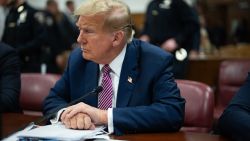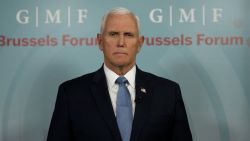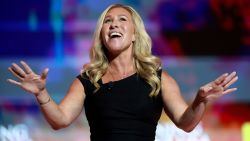New Jersey Gov. Phil Murphy is locked in a closer-than-expected race that remains too close to call as he tries to become the first Democratic governor in more than four decades to win reelection in the Garden State.
Like Virginia – where Republican nominee Glenn Youngkin won Tuesday night – New Jersey has trended reliably blue in federal and local contests but has a history of voting in the party out of the White House in its off-year gubernatorial races.
On top of their loss in Virginia, the close race in the Garden State – where President Joe Biden also won by double digits in 2020 – is a warning sign to Democrats looking to maintain their congressional majorities in next year’s midterms.
With 84% of the vote in, Murphy was tied with Republican Jack Ciattarelli.
Murphy’s lead over Ciattarelli in a number of late polls had appeared to be at or near double digits, giving Democrats confidence about the outcome and shifting some focus to the eventual margin – and what it could portend for next year’s midterm elections.
Murphy’s campaign acknowledges it’s been a tougher evening than they had expected, but they maintain that they will pull it out in the end, believing that the outstanding votes will break for them, a Murphy adviser said.
Like Youngkin, Ciattarelli – a businessman and former state lawmaker – kept Trump at arm’s length, instead hammering Murphy over taxes and what he argued were the effects of the Democrat’s pandemic response on businesses. Democrats are hoping that even a narrow Murphy win will be an affirmation of the party’s commitments to mask and vaccine mandates, which Murphy has championed in a state that has suffered about 28,000 Covid-19 deaths.
The final Monmouth University survey of the race showed Murphy with leads ranging from 8 to 14 points, depending on different models of who comes out to vote. Those figures represent a modest narrowing of the race, in which taxes – an issue that Ciattarelli leads on – were listed as the top issue. But Murphy’s advantage on the question of who voters trust more to handle the pandemic was significantly higher, 45% to 26%, a gap that has stayed mostly consistent since the summer. The Democrat also enjoys a sizable lead on a question that has roiled the Virginia race – education and schools – leading Ciattarelli by 15 points.
Registered Democrats outnumber registered Republicans by more than a million in New Jersey, though voters there have shown a willingness to support moderate GOP candidates, like two-term former Govs. Christie Todd Whitman and, before Murphy’s 2017 election, Chris Christie.
Like in Virginia, New Jersey Democrats and the Murphy campaign have consistently tied the Republican nominee to Trump, who remains deeply unpopular in New Jersey. The complicating factor, though, is that Biden’s approval in the state has sunk over the past few months. (He was 6 points underwater in the Monmouth poll.)
Ciattarelli has downplayed Trump-fueled conspiracy theories over election fraud – at least as it applied to his own prospects.
“Don’t let anybody stay home because they think we can’t win or because it’s rigged,” Ciattarelli said at a campaign event last week. “It’s not rigged here in New Jersey. We can win this race.”
Ciattarelli did not name Trump, but the remark underscored the headwinds created by the former President’s lies about the 2020 election and the awkward dance being attempted by more traditional Republican candidates attempting to keep Trump diehards on board and get them to the polls, without alienating suburban swing voters turned off by Trump’s behavior and rhetoric.
At their second debate, in mid-October, a moderator pressed Ciattarelli over his view of Trump and whether he would accept the former President’s support and campaign alongside him. The Republican nominee, who has been critical of Trump but backed him last year, suggested he had no plans to call in the former President, who has not appeared on the trail in New Jersey despite having a home there.
“I go out there and campaign on my own,” Ciattarelli responded. “I’ll win my own election.”
Murphy, a former Goldman Sachs executive and ambassador to Germany who previously served as the Democratic National Committee’s finance chair, has taken the opposite tack, stumping alongside a who’s who of national Democratic heavyweights. Biden, former President Barack Obama and independent Sen. Bernie Sanders of Vermont, who rallied for the governor at Rutgers University, have all headlined events for him.
Obama, speaking in Newark last month, zeroed in on Ciattarelli for having previously addressed a “Stop the Steal” rally, then later claiming he was unaware of the event’s focus.
“Apparently Phil’s opponent says, well, he didn’t know it was a rally to overturn the results of the last election. Brother, come on,” Obama said. “When you are standing in front of a sign that says ‘Stop the Steal,’ and there’s a guy in the crowd waving a Confederate flag, you know this isn’t a neighborhood barbecue.”
Ciattarelli’s camp, in response, has pointed to his past statements affirming that Biden won the election – remarks he was attacked over by other Republicans during the gubernatorial primary.
In a pair of debates, Murphy also hammered Ciattarelli over the Republican’s opposition to mask and vaccine mandates, arguing that the measures have been crucial in combating the Delta variant surge that ravaged a number of GOP-led states.
“For folks to ignore that, disregard that (Covid response) playbook, is putting lives needlessly at risk,” Murphy said during their second meeting. Ciattarelli’s insistence that decisions over masks and vaccines should be a matter of personal choice, he added, “feels like an answer you’d see in a debate in Texas or Florida.”
Murphy has also sought to spotlight concerns over the fate of abortion rights, which are under siege in GOP-led states and could be dealt a devastating blow at the Supreme Court, where the constitutional right to an abortion could soon face an existential test.
Both candidates support abortion rights, a policy position that puts Ciattarelli at odds with the national GOP. But he opposes a state bill, called the Reproductive Freedom Act, that would codify Roe v. Wade and expand access by allowing more providers to perform the procedure.
Passage of the bill, Murphy said in the debate, would be his “number one agenda item” when New Jersey lawmakers reconvene for their next session later this year.
MJ Lee contributed to this report.




















